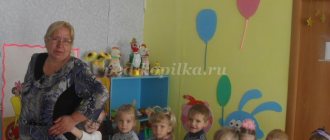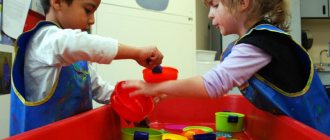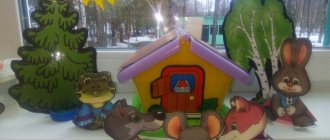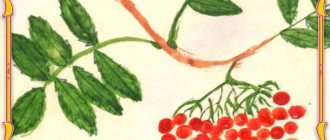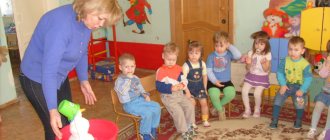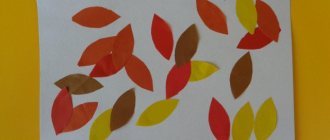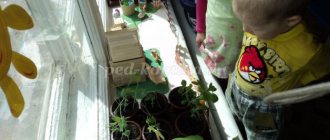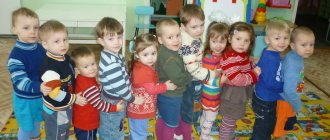Nursery rhymes in the younger group of kindergarten: a large selection of nursery rhymes for children
Nursery rhymes for preschoolers in the junior group of kindergarten are a special collection of rhymes with a more complex meaning than for infants, but with the same useful developmental potential, new words and the ability to develop the speech of a 1, 2 or 3 year old child.
Among the nursery rhymes intended for such a small child, finger games are very popular, to which a separate block of our nursery rhymes is dedicated. However, here you will find a lot of useful works for the development of not only motor skills, but also the baby’s mental abilities, memory, and articulation.
- Finger-boy, where have you been? - I went to the forest with this brother. I cooked cabbage soup with this brother. I ate porridge with this brother. I sang songs with this brother!
- Okay, okay, where were you? - By Grandma! - What did you eat? - Porridge! - What did you drink? - Mash! Porridge is buttery, Mash is sweet, Granny is kind. They drank, ate, flew home, sat on their heads, and began to sing.
- Forty, forty! Where were you? - Far! She lit the stove, cooked porridge, jumped on the threshold - called guests. The guests arrived and sat down on the porch. She gave to this, She gave to this, She gave to this, She gave to this, But she didn’t give to this: He didn’t walk on water, He didn’t chop wood, He didn’t light the stove, He didn’t cook porridge...
A horned goat is walking, a butted goat is walking, her legs are stomping, her eyes are clap-clap. Those who don’t eat porridge, don’t drink milk, gore, gore, gore.
The night came, brought darkness; The cockerel dozed off, the cricket began to sing. It’s late, son, lie down on your side, bye-bye, go to sleep...
Kitty, kitten-cat, Kitty - gray tail! Come, kitty, spend the night, rock my baby, lull her to sleep.
Bye-bye, bye-bye, let's buy felt boots for our son, put them on his little feet, and let's go down the path. Our son will walk and wear new felt boots.
Bye-bye-bye-bye, Don't lie on the edge. A little gray top will come, He will grab the barrel. He will grab you by the barrel and drag you into the woods, under the broom bush. Don’t come to us, little top, don’t wake up our baby.
The mice are dancing in circles, the cat is dozing on the bed. Hush, mice, don't make noise, don't wake up Vaska the Cat. When Vaska the cat wakes up, he will break up the whole round dance.
Cockerel, cockerel, Golden comb, Butter head, Silk beard! Why do you get up early, sing loudly, and don’t let Vanya sleep?
The grass ant rose from its sleep, the tit bird took the grain, the bunny took the cabbage, the mice took the crust, the boys took the milk.
Rain, rain, more. The grass will be thicker, the leaves will be greener, the berries will be redder.
Rainbow-arc, Don't let it rain. Come on sunshine, Bellflower!
Our ducks in the morning - quack-quack-quack! Quack-quack-quack! Our geese by the pond - Ga-ga-ga! Ha-ha-ha! And the turkey in the middle of the yard - Ball-ball-ball! Bullshit! Our little girls at the top - Grru-ugrr! Grru-ugrr! Our chickens through the window - Ko-ko-ko! Ko-ko-ko-ko! And how Petya the Cockerel, Early, early in the morning, will sing to us cuckoo!
Nursery rhymes
Folk nursery rhymes will amuse the baby during feeding and help the mother quickly feed the fidget.
***
Tilly-hour, Tilly-hour! Our lunch arrived. We eat a spoon for mom, We eat a spoon for dad, For the dog and for the cat, Sparrow knocks on the window: “Give me a spoon too!” So lunch is over.
***
Shirt, shirt, White-haired girl, Jumped on the threshold, Called guests. Guests, to the yard - Porridge, on the table, Guests from the yard - Porridge from the table.
***
The magpie-crow cooked porridge, fed the children, gave it to this one, gave it to this one, - Where were you? He didn’t chop wood, he didn’t light the stove, he didn’t cook porridge, he came later than everyone else.
***
A horned goat is following the little guys. Who doesn't eat porridge? Doesn't drink milk? Gore, gore, gore!
*** I bake, bake, bake, The kids all have a pie, And for my dear mother I’ll bake two gingerbread cookies. Eat, eat, mommy, two delicious gingerbread cookies. I'll invite the kids and treat them to pies -
Eat, please!
***
Lyuli, lyuli, lyuli, The ghouls flew in, The ghouls began to coo, The ghouls began to fuss: They flew into a corner, They lit a fire, They began to cook porridge, They began to feed Masha.
***
Slowly, little by little, little by little, slowly, We ate porridge with you, Isn’t the porridge good?! This is a spoon, this is a cup, There is buckwheat porridge in the cup. The spoon was in the cup, the buckwheat porridge was gone.
***
Who is our favorite? - The first spoon is for mom, and the second is for whom? - Yes, for your dad, for whom the third spoon? - For a cheerful nesting doll, Eat for a woman, Eat for a grandfather, For a boy - for a neighbor, For girlfriends and friends, Eat more and don’t regret it! Eat for the holiday, noisy, bright, For the guests and for the gifts, For the kitten, for Timoshka This little spoon And for the red cat, Here the plate is empty!
***
The delicious porridge is steaming, Dasha sits down to eat the porridge, the porridge is very good, they ate the porridge leisurely. Spoon by spoon, Ate a little at a time.
*** Duck duckling, Cat kitten, Mouse little mouse Calling for lunch. The ducks ate, the cats ate, the mice ate. Have you not yet? Where's your spoon? Eat at least a little.
*** The donut, the flatbread, sat in the oven, looked at us, and wanted to put it in my mouth.
***
Till-hour, tick-till-hour, we're having lunch now We'll eat a spoon for mom, We'll eat a spoon for dad, For the dog and for the cat, the sparrow is knocking on the window, give me a spoon too... so lunch is over.
*** Lyuli, lyuli, lyulenki, The ghouls flew in, The ghouls began to say: “What should we feed Sonechka?” One will say: “porridge”, Another – “yogurt”, The third will say – “milk, And a ruddy pie.”
***
Our Vanyusha is a fidget and won’t finish his lunch. They sat down, stood up, sat down again, and then ate all the porridge.
*** Oh, lyuli, lyuli, lyuli, ships sailed into the sea, they brought porridge to Masha. Kasha's little milk For my beloved daughter. Masha, open your mouth, swallow the sweet porridge. And whoever eats porridge, listens to mom and dad, grows up strong, healthy and beautiful.
***
Am! Am! Am! I'll give you candy, But first, for our mother, eat a spoonful of semolina porridge! Am! Am! Am! Eat the porridge yourself, Vanya! Eat a spoonful for daddy, you'll grow up a little more! Am! Am! Am! If you don't eat, I'll eat it myself. And I’ll grow a whole mile with every spoon! I will become completely big, and then I will eat you!
MAGAZINE Preschooler.RF
Pedagogical project “Rhymes” (junior group) Topic: “Development of cognitive and research activity of children”Educator of MADOU "TsRR-Kindergarten No. 21" Kashapova E.M. Lysva, Perm region
Project name: "Rhymes"
Project developer – Kashapova E.M., teacher of the younger group
Project manager – Kashapova E.M., teacher of the junior group
Type of project – educational and gaming
The project implementation period is 09.01. 17-30. 01.17.
Place of implementation of the project - junior group of MADOU
CRR "Kindergarten No. 21"
Project participants: group teacher, children, parents.
Brief description of the project:
This project is aimed at developing the cognitive activity of children. The goal of the project is to introduce children to nursery rhymes, develop the child’s speech skills, memory, imagination, thinking; activate cognitive and mental development.
The goal is expected to be achieved through solving the following tasks.
- Increase interest in Russian folk nursery rhymes.
- Encourage children to actively participate in play activities, using messages of different form and content.
- Develop monologue and dialogic speech of children.
- To develop thinking, the ability to pick up and read familiar lines of nursery rhymes, to convey the content of nursery rhymes and songs with gestures and actions. —
- Evoke an emotional response to a work of art in children.
The project participants are children and parents of the junior group of preschool educational institutions.
The project is designed for 3 weeks.
The expected result at the end of the project is
- Creating favorable conditions for the child’s self-development.
- The child shows interest in playing with rhyme and words.
Based on the results of observations, as well as conversations with children in their group, we can conclude that children do not know nursery rhymes well enough and do not know how to act out and stage nursery rhymes.
One of the ways to solve this problem could be the development of a set of activities aimed at developing children’s knowledge of nursery rhymes and the ability to stage them, as well as close interaction between the teacher, children and parents in working in this direction.
Relevance
In preschool childhood, a very important process of mastering the native language, unique for the development of the child, occurs. During the period of early preschool age, folklore acquires special significance and helps to develop coherent speech. I based my work on the principles of carefully selecting literary texts for children and integrating folklore works into various types of children's activities.
That is why this project “Rhymes” will expand the vocabulary of children and activate cognitive and mental development.
Getting to know folklore develops interest and attention to the world around us and teaches us a lot.
The sonority, rhythm, melodiousness, and entertaining nature of nursery rhymes attracts children, makes them want to repeat and remember, which in turn promotes conversational speech. They are easily remembered by children, these works are easy to play and combine with any kind of movements.
Memorizing poetic texts and nursery rhymes with the participation of hands and fingers leads to the fact that the child remembers better, the imagination develops and the baby’s mental activity is activated.
Nursery rhymes are of great importance for instilling friendliness, goodwill, and a sense of empathy in children.
Analysis of the situation in the junior group:
From conversations with parents, it became clear: in most families in our group, parents practically do not use small forms of folklore with their children.
Families know these works of oral folk art less and less; now they remember only a few riddles and sayings, and among the nursery rhymes they call one “Magpie - white-sided...” .
Thus, I found out that the work on the use of small forms of folklore is not sufficiently organized. Parents do not fully use their developmental potential, including for speech development.
So, I was once again convinced that the use of various forms of folklore for preschool children is simply necessary.
Problem: cognitive interest is poorly developed.
Purpose: to introduce children to nursery rhymes, to develop the child’s speech skills, memory, imagination, thinking; activate cognitive and mental development.
Tasks:
- Increase interest in Russian folk nursery rhymes.
- Encourage children to actively participate in play activities, using messages of different form and content.
- Develop monologue and dialogic speech of children.
- To develop thinking, the ability to pick up and read familiar lines of nursery rhymes, to convey the content of nursery rhymes and songs with gestures and actions. —
- Evoke an emotional response to a work of art in children.
Possible risks:
- parents' reluctance to participate in joint activities with children
- lack of financial resources
- morbidity among children during the project implementation period.
Project product:
- Exhibition of drawings
- Album “My favorite nursery rhyme”
- Baby books, picture books
- Card index of nursery rhymes and games
- Collage “Favorite nursery rhyme characters”
- Mini-museum "Poteshki"
Expected result:
A high level of knowledge development in children of nursery rhymes (based on the results of observations and conversations with children).
Project implementation plan:
Events Date responsible
Stage 1. Introductory.
Goal: Create conditions for the implementation of the project.
Deadline: 01/09/17. -13. 01.17.
Creating conditions for working with children and parents:
- choose illustrated material for nursery rhymes
- select folklore material appropriate to the age of the children
- make a card index of nursery rhymes
- selection of games and other material on the topic; 01/09/17. -13. 01. 17. Teacher Kashapova E.M.
Work with children
Observations of children, conversations with them (identifying the level of knowledge about folklore) 01/09/17. -13. 01. 17. Teacher Kashapova E.M.
Interaction with parents
- familiarize parents with the goals and objectives of the project
- consultations for parents “Games with nursery rhymes at home” , “Developing fine motor skills” , section in the corner for parents “What we teach” ); 10. 01. 17. Teacher Kashapova E.M.
Stage 2. Basic.
Goal: Organizing work with children and parents
Deadline: 01/16/17. -27. 01.17.
Work with children
- Reading and playing out the nursery rhyme “Like our cat” .
- P/i "Mousetrap"
- Round dance games “Cap” , “Bubble”
- Drawing “Fluffy kitten” 01/16/17.
Teacher Kashapova E.M.
- Reading and acting out nursery rhymes “Pussy, pussy scat” , “Gloves”
- Drawing “Cockerel” (with your palm)
- P/n “The chicken went out for a walk”
- Round dance game “A goat walked through the forest...” 01/19/17. Teacher Kashapova E.M.
- Reading and playing out the nursery rhyme “Kitsonka-murysonka”
- Round dance game “Mice dance in a circle”
- Modeling “Let's bake gingerbread cookies” 01/23/17. Teacher Kashapova E.M.
- Dramatization game “Cat House”
- Round dance game “Vanya Walks”
- Construction “House for a cat” 01/25/17. Teacher Kashapova E.M.
- Reading and dramatization of the fairy tale “Teremok”
- Reading nursery rhymes, calls about the sun.
- Modeling “Rays for the Sun” , 01/27/17. Educator Kashapova E.M.
Interaction with parents
Design of the traveling folder “Rhymes our friends” During the second stage Educator Kashapova E.M.
Take part together with the child in drawing “My nursery rhyme” During the second stage Educator Kashapova E.M.
Homework: collage “Favorite characters of nursery rhymes” 01/16/17 – 01/27/17. Teacher Kashapova E.M.
Individual consultations, conversations During the second stage Educator Kashapova E.M.
Stage 3. Final.
Goal: Evaluation and presentation of project results
Deadline: 01/23/17. -27. 01.17
- Exhibition of drawings 26.01.17. Educator Kashapova E.M.
- Creation of the mini-museum “Poteshki” 01/23/17. -27. 01. 17. Teacher Kashapova E.M.
- Speech at the teachers' council work experience During the third stage Educator Kashapova E.M.
Analysis of resources required to support the project:
- Temporary: 3 weeks
- Scientific and methodological: M.Yu. Kartushina “Logorhythmics for kids” , Kuprina L.S., Budarina T.A. “Introducing children to Russian folk art” magazines, Internet.
- Organizational: project implementation plan, conversations with children and parents, individual conversations, observations.
- Motivational: agitation and motivation of parents, interest of children.
Project management scheme:
Functions of educator, project manager:
- Development and implementation of the project in a group of preschool educational institutions
- Creating conditions for project implementation
- Organization and coordination of relationships between project participants
- Monitoring project implementation
- Carrying out analysis of results
- Organization of events provided for by the project
- Resolving issues that arose during the project implementation.
Parental functions
- Help in purchasing books and toys
- Interaction with project participants.
Children's functions:
- Attendance at all events provided for by the project
- Interaction with project participants.
Bibliography
- Bondarenko A.K. “Didactic games in kindergarten” - M.: Education, 1991.
- Kuprina L.S., Budarina T.A. “Introducing children to Russian folk art” SP.: Detstvo-press, 2001.
- Gerbova V.V. “Introducing children to fiction” - M.: Mozaika - Synthesis, 2010.
- Evdokimova E.S. “Design technology in preschool educational institutions” - M.: TC Sfera, 2008
| Next > |
Long-term project in the 1st junior group “Rhymes for Kids”
Project duration: 09.2020 - 06.2021
Project participants: children, parents and teachers of the 1st junior group.
“The task of an adult is to reveal to a child the miracle that a book contains.”
A nursery rhyme is a small genre of oral folk art, a song-sentence directly related to a gesture.
Relevance. At a young preschool age, nursery rhymes play a special role, and the unique uniqueness of the sound speech flow is especially valuable. Simple rhyme, emotional coloring, sound combinations and their melodiousness create the effect of musicality. Therefore, a nursery rhyme, first of all, serves as an assistant in developing the sound culture of speech. Speech hearing and pronunciation of sounds also develop. The nursery rhyme contains many bright and colorful word pictures, which allows you to learn new forms of words denoting objects. Reading nursery rhymes occurs with many repetitions, which helps memorize words and then use them. The content of many nursery rhymes is rich in verbs. And as a result, the child’s vocabulary is enriched. Along with this, the formation of the grammatical structure of speech and the development of monologue and dialogic speech occur. During the period of early preschool age, nursery rhymes are the most understandable, interesting, musical and educational means for a child, which make it possible to lay a solid foundation for the psychophysical development of a child in the preschool period of childhood.
Recently, we often hear the statement “people have stopped reading.” From conversations and observations of communication between parents and children, it can be assumed that modern parents really communicate little and read books to their children, due to their employment or dependence on modern media (Internet , TV, all kinds of gadgets).
To clarify, we invited parents to answer the “Child and Book” questionnaire as part of Children’s Book Week. From the results of the survey, it is clear: all parents who took part in the survey read books to their children (100%), which is very gratifying. 60% read to children several times a week, 30% daily, and 10% rarely. Half of the parents read at the child’s request, and the other half both at the child’s request and on their own initiative. All respondents have books at home: there are poems and fairy tales, nursery rhymes, and additionally encyclopedias. Half of the parents surveyed said that at home their children talk about what they read in kindergarten. It is gratifying that all parents read various literature: fiction, educational, periodicals, which is very pleasing. From the analysis of the questionnaires, we concluded that parents are involved in the development of their children, but for this they do not have enough time and ideas about the benefits of folklore (nursery rhymes) and memorizing short works for children of primary preschool age.
Folklore is one of the most effective and vibrant means, fraught with enormous didactic opportunities. Acquaintance with folk works enriches children's feelings and speech, shapes their attitude towards the world around them, and plays an invaluable role in all-round development. Children's folklore is a vast area of oral folk poetry. This is a whole world - bright, joyful, filled with vitality and beauty.
Taking into account the relevance of this issue, I developed the project “Rhymes for Kids”, the goal of which was to form an emotionally positive attitude towards the book through folklore.
Project objectives:
- Development of children's speech, enrichment and activation of vocabulary.
- Cultivating a caring attitude towards books.
- Formation of the need for reading.
- Increasing the level of development of speech activity.
- Acquaintance with the surrounding natural world, with the way of life and way of life of the Russian people.
- Involving parents in creating conditions for developing children's interest in books at home and in kindergarten.
Expected results of the project:
- There is an emotional responsiveness of children to the listened works of folklore.
- The range of children's reading has been expanded.
- The child's vocabulary has been enriched.
- The need to read a book is formed.
- Parents were active in creating conditions for the development of children's interest in books.
Project product:
creating a card index “Rhymes for Kids”
- creating a book “Our Favorite Nursery Rhymes” together with parents, followed by viewing at a parent meeting. Creation of a lapbook “Reading to Children”, a children’s book “Rhymes, Songs”.
Working with parents
Questionnaire “Child and Book” (Appendix 1)
- Conversation “The role of nursery rhymes in the development of young children” (Appendix 2)
- Book exhibition “Reading with Children”
- Folder “How and what to read to children 2-3 years old”
- Booklet “Reading to Children”
Construction of work taking into account the following principles: clarity, consistency, activity, continuity with the family, variability. Methods: verbal conversations, storytelling, reading fiction, listening to audio recordings, looking at books, illustrations, albums, didactic games, showing theatrical performances, participating in leisure, entertainment, and holidays.
Literature:
- Batyaeva S.V., Savostyanova E.V. Album on speech development for the little ones. M.: ZAO ROSMEN-PRESS, 2010. 88 p.
- Vinnikova G.I. Classes for children 2-3 years old: development of speech, fiction, visual arts. Sphere shopping center, 2009. 128 p.
- Caramel" for kids (songs, nursery rhymes, fairy tales, poems). M.: Omega, 2007.
Contents of self-education work for the 2020-2021 academic year
September. Selection of material necessary for working with children and parents on the topic “Development of speech in young children through folklore.” Studying the topic, setting goals and objectives on this topic. Planning.
October. Learning and reciting nursery rhymes with children in everyday life. Questioning of parents on the topic: “The child and the book”, parent meeting “The role of nursery rhymes in raising a child.”
November. Studying the topic “Printed board games based on Russian folk tales.” Joint and independent examination of illustrations and pictures. Creation of creative works “My Favorite Fairy Tale” together with parents. Decorating a book corner on the theme “Rhyme Songs”.
December. Decoration of the “Our Creativity” corner. Studying the topic “Theatrical games as a means of developing children’s speech.” Enrichment of the dressing area. Learning poems and songs for the New Year, theatrical performance “Gifts of Santa Claus.” Finger games on the theme “winter”.
January. Decorating a theatrical corner in a group, making a theater based on Russian folk tales. Studying the topic: “Use of folklore in working with children.” Watching the presentations “Such different nursery rhymes” with children.
February. Studying the topic: “Use of folklore in working with children.” Joint and independent examination of illustrations and pictures. Using nursery rhymes while washing, dressing, undressing, and preparing for bed. Consultation for parents “The role of folklore in the development of children.”
March. Getting to know nursery rhymes and poems about mom. Entertainment “Sunny, like mom.” Consultation “Speech and fingers”. Participation in the general holiday “Farewell to Maslenitsa”, didactic games “Find out which nursery rhyme is an excerpt from”, “Find out the nursery rhyme”.
April. Studying the topic “introduction to chants, nursery rhymes about the sun.” Entertainment "Little suns - helpers of the big sun." Creating a card index of nursery rhymes. Creation of the book “Favorite Nursery Rhymes” together with parents.
May. Consultation for parents “How to learn poetry correctly.” Parent meeting “Our successes”. Replenishment of the development environment: lacing games, sports corner. Learning nursery rhymes about animals. Entertainment “Forest animals visiting children.” Quiz game "Fairy-tale heroes".
Self-analysis of the self-education plan. Presentation of the project “Development of children’s speech through folklore.”
Expected result
By the end of the year, the children's vocabulary was enriched with new words, phrases, and expressions. The pronunciation of sounds became clearer and more expressive. Primary skills in perceiving the phonemic and lexical aspects of speech have been formed.
An interest in oral folk art and fiction arose.
Parents develop an interest and understanding of the need to use small forms of folklore in speech development.
The development environment of the group in this direction has been enriched.
The children remembered a lot of nursery rhymes, songs, and Russian folk tales.
Memory and attention have improved.
We draw nursery rhymes: NOD “The sun is shining...”
